Dreams of the Devas - A Vijayanagar AAR
- Thread starter Fiftypence
- Start date
-
We have updated our Community Code of Conduct. Please read through the new rules for the forum that are an integral part of Paradox Interactive’s User Agreement.
You are using an out of date browser. It may not display this or other websites correctly.
You should upgrade or use an alternative browser.
You should upgrade or use an alternative browser.
intreasting AAR, I like this AAR, just started it. how far into europe can you see?
J. Passepartout: As it turned out, going west was really not worth it.
stnylan: Don't worry, west is no longer a consideration.
Duke of Wellington: He would have been a legendary emperor if only he had lived.
anonymous4401: It is indeed.
Bismarck1: Welcome! I can see all of Europe. It's mostly Austrian.
Second to last update coming up.
stnylan: Don't worry, west is no longer a consideration.
Duke of Wellington: He would have been a legendary emperor if only he had lived.
anonymous4401: It is indeed.
Bismarck1: Welcome! I can see all of Europe. It's mostly Austrian.
Second to last update coming up.
Part 28 - Invading Afghan Lands Is Never A Good idea
The remaining years of the 1750s were largely concerned with domestic matters, with the Tibet regions of Lhasa and Dangla embracing Hinduism. Elsewhere, Da Viet were made vassals.
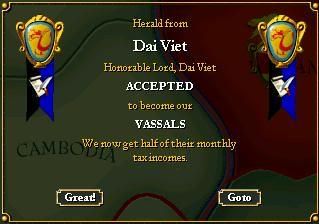
However, late 1758 provided an opportunity. A dispute over borders arose with Persia, an issue which was to run until 1760, when Bharatvarsha declared war. Four separate armies invaded, laying siege to the provinces of Zahedan, Surkhandarya, Samarkand and Kushka.
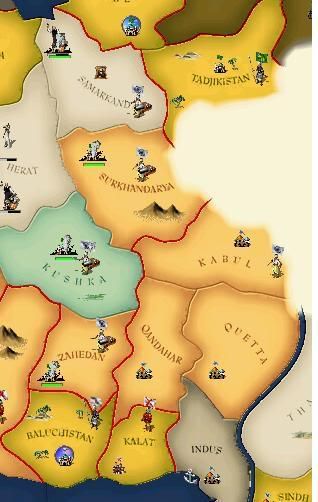
The war started well, and by November Zahedan fell, followed by Kushka in the following May. However, the siege of Samarkand was broken, and all of Bharatvarsha's armies suffered harsh attrition in the difficult mountainous terrain of Afghanistan. Surkhandarya fell in July, and Herat was taken in March 1672, only to be retaken almost immediately. The invasion began to stall, as Persia's defensive position and numerically superior armies began to tell. Bharatvarsha's armies were pushed back towards the river Indus, and attempts to break Persian sieges of Surkhandarya and Kushka failed. The war was clearly not winnable, and so with some reluctance Emperor Venkatapati offered a status quo peace, which was accepted.
With his western ambitions thwarted by difficult terrain, Venkatapati instead resolved to bring all of Indochina under his control. In May 1763:
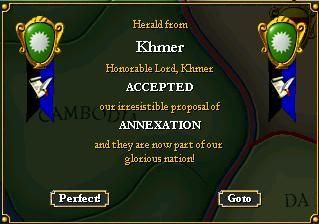
Most of Bharatvarsha's treasury was spent on trade and missionaries, with relative success on both fronts. Monopolies were established in Isfahan, Kanto and Malacca, and Qaidan Pendi and Ningxia were brought into the Hindu faith. In 1767 Dai Viet were diplomatically annexed, leaving Annam as the last independent state in Indochina.
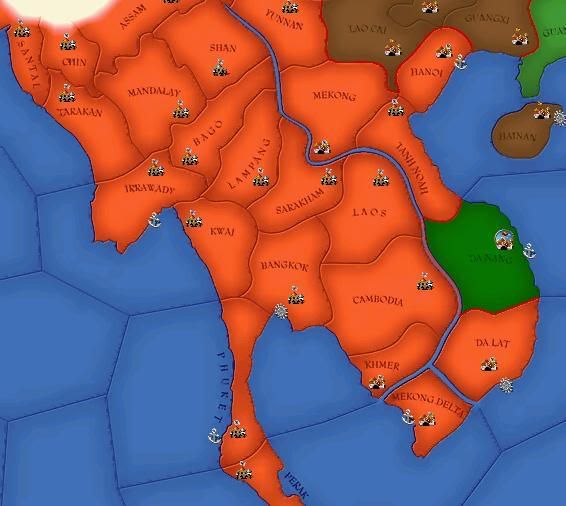
Over the next few years relations were improved with Annam, and pretty soon they were made a vassal. Ten years later, they were annexed. In the meantime more and more areas were converted, Qilian Pendi in 1774, Nepal in 1782 and Da Lat in 1785. However, there was one region that Venkatapati could not even afford to send missionaries to, the city of Shanghai.
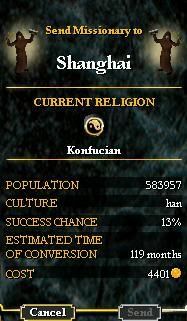
Costs an interesting amount.
The Empire by the 1780s was powerful, but options for further expansion was somewhat limited. To the west was Persia, where the mountains of Afghanistan proved to be easy to defend and very difficult to attack, and to the east was China, which although weak had spent a lot of money improving it's fortifications, removing the soft underbelly that Bharatvarsha had so profitted from against Manchu. A successful war with China would be long, costly and probably not worthwhile, and so for the time being Bharatvarsha sat waiting for an opportunity to present itself.
A period nearly or prolonged peace (Afghan adventure notwithstanding). I am quite surprised. And surprised that you were unable to get anything out of that war. Interesting.
Afghanistan is bulit to be defended, I hate invading there. After Indochina will it be Indonesia?
Indonesia would be nice, a lot of islands for vacationing, as long as no natives greet you with spears. And then, hoping that China has a technology-poor army, war to the north sometime in the nineteenth century.
with all these diffrent faiths in your empire what is your tolorance level for all the faiths?
The end is nearing, but there should still be time enough for one very big war. 
Speaking of which, the Western Powers have hardly shown up in this AAR at all...
Speaking of which, the Western Powers have hardly shown up in this AAR at all...
stnylan: To be honest, I didn't really want anything from it. The provinces were all muslim and worthless anyway, so I just took the white peace.
Duke of Wellington: Bit's of Indonesia, yes.
J. Passepartout: Yes, Indonesia is nice.
Bismarck1: Basically, 0 tolerance for Chistianity, with the other sliders as high as they can go. It's a fine act to balance, but as long as stability remains above 0 I'm all right.
anonymous4401: The Western powers haven't turned up because even the AI isn't stupid enough to attack a huge empire that could kick their arses back to Europe with ease.
Duke of Wellington: Bit's of Indonesia, yes.
J. Passepartout: Yes, Indonesia is nice.
Bismarck1: Basically, 0 tolerance for Chistianity, with the other sliders as high as they can go. It's a fine act to balance, but as long as stability remains above 0 I'm all right.
anonymous4401: The Western powers haven't turned up because even the AI isn't stupid enough to attack a huge empire that could kick their arses back to Europe with ease.
Part 29 - Full Circle
The Sino-Bharatvarshan War (1788-1792) was a pure act of greed on the part of the aggressors, who desired to take some rich Chinese lands. In November 1788 troops poured across the border, meeting little resistance, attacking in the east from Shanghai as well as the western border.
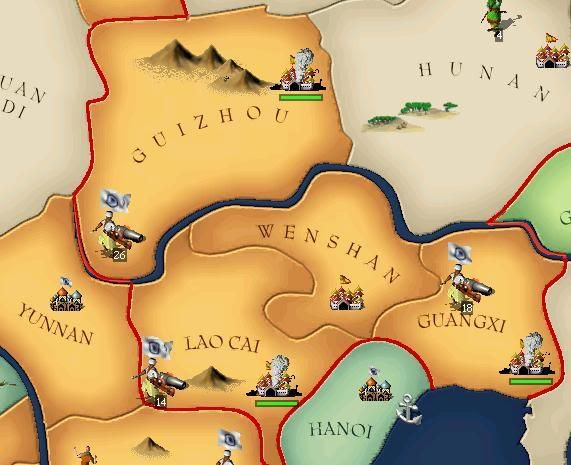
At the Battle of Beijing, the Chinese army attacked the Hindu army besieging the city, resulting in total defeat for the Chinese with the slaughter of their entire army. From this point on, China was constantly on the backfoot. City after city fell to the invaders, Beijing itself being occupied on the 16th February 1790. The armies of Bharatvarsha delved further into the Chinese mainland, controlling most of China and small areas of Manchuria by 1792.
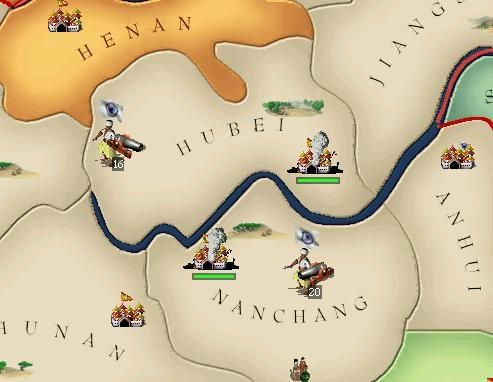
The last Chinese stronghold was the difficult, mountainous terrain of Shandong, which was invaded in early 1792. The Indians were repulsed twice, and would have tried a third time if it had not been for the fact that peace was signed on May 7th. The war was of course a massive disaster for China, and the terms offered by China reflected that.
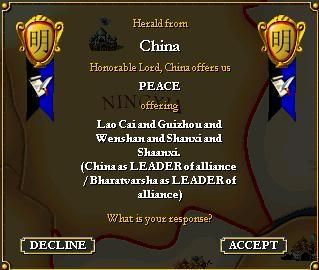
Having expanded and secured her borders, the Empire begun a program of the exploration and colonisation of the Mollucas, as well as developing the concept of a war of manoeuvre in military doctrine. The program was largely a success, and so the spice islands were now divided mostly between China and Bharatvarsha.
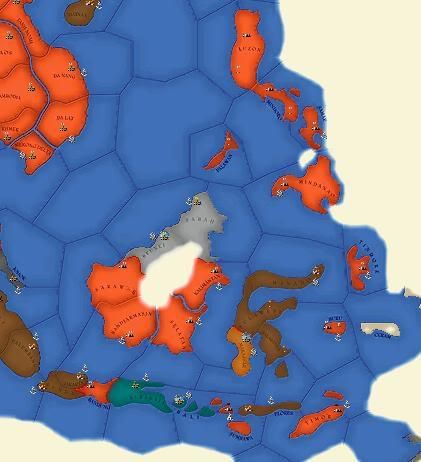
Meanwhile, in 1795 Cambodia was converted to Hinduism, and in 1802, following more rebellions in China, some great news reached Delhi, that Zhejiang had defected. The early years of the 1800s were seen out in peace, as the Empire concentrated on improving the internal economy, with the building of a weapons manufactury in Tarakan and a goods manufactury in Panjab. In 1816, good news arrived when the province of Shaanxi converted to Hinduism.
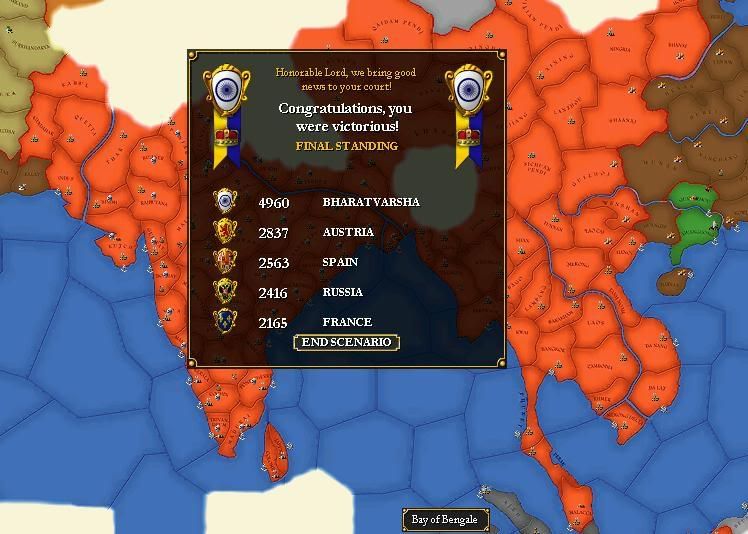
And so, with the great Hindu empire of Bharatvarsha being one of the most powerful and developed nation in the world (second only to Austria in land technology), the dreams of the devas had been fulfilled. The monotonous, endless cycle of death, despair and destruction had been broken forever thanks to the actions of Lord Krishna, Devesh Chandra and all the other devas, and now they beheld the glory that was Bharatvarsha, great, golden, magnificent, holy.
"The cycle is well and truly broken," said Lord Krishna to Javada, who had in his human form been Devesh Chandra. "Over and over again, Vijayanagar and whatever it may become is free, to create it's own destiny. Through the aeons, sometimes it will triumph, sometimes it will despair."
"What should we do?" said Javada.
"We should just let the world be as it is, free and unpredictable. The infinite recurrences are no longer static, but can change, and with each aeon the universe will become a little bit more perfect. Just as the humans who toil down in the world hope for bliss, so does the universe. Eventually, the cycle of eternal recurrence will come to an end, and everything will be bliss."
"But the world needs a little bit of guidance, a gentle nudge in the right direction?"
Krishna smiled, knowingly. "Of course, of course it does."
1st January 1419
The Emperor's Palace, The City of Victory
The Empire of Vijayanagar faced threats from all sides. In the north were the Muslims, who dominated the continent, and in the south lay the treacherous fellow Hindus of Mysore. Vijayanagar was not safe, and all this pressed on the mind of Emperor Deva Raya I, but his thoughts were interrupted by a courtier announcing the arrival of a visitor. It was a man, sweaty and dirty, but with something about him, some timeless quality that made Deva Raya sit up and take notice.
"Yes, what do you want?" asked the Emperor.
"With blessings from the great deva Lord Krishna, I come to offer my services as a soothsayer and mystic."
"Well, all right, if you can prove yourself."
Devesh Chandra, devotee of the great Lord Krishna, smiled, for he was home.
The End
Well, congratulations, but still I had hoped on some sort of show down, but it would have been unlikely with you being the only major power in Asia.
I have to admit that I'm surprised that you were stopped by Persia!  Still you created a very large empire. I enjoyed that story!
Still you created a very large empire. I enjoyed that story! 
Joe
Joe
And so it is complete. A very well-rounded AAR, and very much enjoyed. A lovely note on the ending too.
Excellent... You reversed my suggested order of territorial expansion, but it was for the best. Vijayanagar will never suffer at the hands of evil agains.
Great ending, great job and an excellent AAR all round. I've enjoyed this one a lot.
GrimPagan: Thanks for reading. 
Storey: Well, mountains, plus the fact I fought the war for the sake of fighting the war...
stnylan: Thanks.
anonymous4401: Cheers
J. Passepartout: Well it will, but each time it will be stronger and better prepared.
Duke of Wellington: Thanks for reading.
Storey: Well, mountains, plus the fact I fought the war for the sake of fighting the war...
stnylan: Thanks.
anonymous4401: Cheers
J. Passepartout: Well it will, but each time it will be stronger and better prepared.
Duke of Wellington: Thanks for reading.

